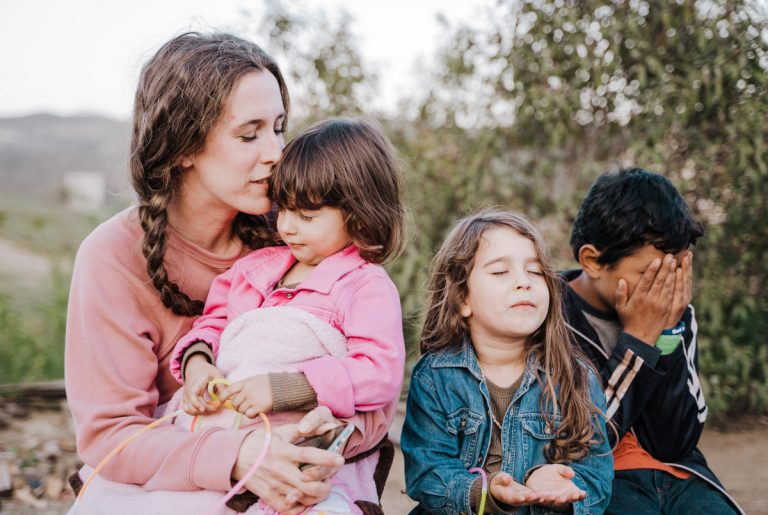In the last few decades, researchers have increasingly come to understand the importance of understanding our emotions and handling them in a healthy way – known as ‘emotion coaching.’ If you’re a parent curious about emotion coaching, doing so can help your kids become more resilient, independent, and emotionally mature.
The term ‘emotional intelligence’, introduced by Daniel Goleman in his 1995 book, has become commonly used by researchers, counsellors and the mainstream public.
You can help your child develop emotional intelligence by “coaching” them, using principles researchers have found work well. “Emotion coaching” can help you avoid common pitfalls as you guide your children toward becoming successful, happy adults.
What is emotion coaching?
Emotion coaching helps children to understand the different emotions they experience, why they occur, and how to handle them. In the simplest terms, you can coach your children about emotions by comforting them, listening, understanding their thoughts and feelings, and helping them understand themselves.
This will help your children to feel loved, supported, respected, and valued and with an emotionally supportive foundation, you will be much more successful at setting limits and problem solving.
Emotion coaching also helps children to become comfortable with their own feelings and learn to express their emotions in constructive ways.
Benefits of emotion coaching for children
Researchers have found that children who feel love and support have more friendships and live healthier, more successful lives. They also are at lower risk for youth violence, antisocial behaviour, drug addiction, premature sexual activity, and adolescent suicide.
According to John Gottman, author of the book Raising an Emotionally Intelligent Child, “Researchers have found that even more than your IQ, your emotional awareness and your ability to handle feelings will determine your success and happiness in all walks of life, including family relationships.”
Learning how to emotion coach
There are simple principles you can follow when learning to emotion coach. These aren’t complicated and are likely to become second nature once you’ve put them into practise a few times.
Step 1: Understand how you deal with feelings
Before you can become an emotion coach, you must first understand your own approach to emotions. Some parents, for example, are uncomfortable with their child’s negative emotions. If a child feels sad, you might think that if you fix the problem that created the sadness, the sadness will go away. You might be uncomfortable with your own anger because it makes you feel out of control, and in turn you discourage anger in your children.
Gottman suggests asking yourself questions to uncover why you might have developed certain responses to emotions like sadness and anger.
- Did your parents treat sad and angry moments as natural occurrences?
- Did your parents lend an ear when family members felt unhappy, fearful, or angry?
- Did your family use times of unhappiness, fear, or anger to show each other support, offer guidance, and help each other solve problems?
- Were sadness, anger and fear shoved under the blanket or dismissed as unproductive, frivolous, dangerous, or self-indulgent?
Step 2: Believe that your child’s negative emotions are an opportunity for closeness and teaching
Reasoning away your child’s emotion with logic rarely works. Instead, a child’s negative feelings become integrated when children talk about them, label them, and feel understood. When children feel that their parents understand them, they feel closer to them.
Research has shown that parents who have become good at emotion coaching believe their child’s feelings are important, even if their actions aren’t. Such parents understand that experiencing negative emotions, such as sadness, anger or fear, is a chance for parents and children to grow closer and an important opportunity to problem solve the factors causing their child’s feelings.
Step 3: Listen with empathy and understanding, then validate your child’s feelings
In the book Between Parent and Child, psychologist Haim Ginott discusses his belief that children need to be understood before they can accept correction.
If you want to understand your child, you need to put yourself in their shoes. Empathic listening – the heart of emotion coaching – can help.
Empathic listening involves fully engaging with your child by using your:
- Eyes to identify physical evidence of your child’s emotions, such as a suddenly reduced appetite.
- Ears to hear the underlying messages behind what a child is saying.
- Imagination to put yourself in your child’s shoes to understand how they’re feeling.
- Words to reflect back what you hear, see, and imagine in a soothing, non-judgmental way. These words also help the child label the emotion.
- Heart to feel what their child is feeling.
Once your child feels understood, let them know that their feelings and wishes are okay, even if their actions aren’t.
Step 4: Label your child’s emotions
Children often don’t know what they’re feeling. If you label an action – by observing aloud that they seem angry, sad or disappointed – you can help your child transform a scary, uncomfortable feeling into something identifiable and normal. Researchers have shown that the simple act of labelling an emotion has a soothing effect on the nervous system, which helps children recover more quickly from an upsetting experience.
Often a chance to label an emotion comes up when you’re listening empathically. Keep in mind that it’s easy to fall into the trap of telling your child how they ought to feel instead of what they are feeling.
Step 5: See issues through to their end
An important part of emotional coaching is to resolve issues and situations with your child. This will involve:
- Setting limits on inappropriate behaviour. Even though it’s important to validate your child’s feelings, you don’t have to validate their actions. For example, a parent might say, “You seem mad that Danny took that game away from you. I would be, too, but it’s not okay for you to hit him. What can you do instead?”
- Following through with appropriate consequences and be consistent. The ideal time to use emotion coaching is right after your child misbehaves and before you deal out the consequence.
Identifying the goal your child was trying to reach with their behaviour by simply asking your child what they were trying to accomplish. - Thinking of possible solutions. Allow your child to think up solutions to a problem before you offer suggestions. This helps your child develop problem-solving skills.
- Evaluating the proposed solutions based on your family values. When your child suggests solutions, ask questions like, “is this solution fair,” “how will this solution work,” or “how are other people likely to feel about this solution?”
- Choosing a solution. If your child comes up with an unworkable solution, it’s okay to go forward if it is harmless. Let your child learn from seeing the consequences of their choices – just leave the door open to rework the solution if it doesn’t seem to be working.
- Developing a plan of action to accomplish the solution. Work with your child to think of ways to tackle the solution and hold them accountable – with kindness – to see it through.
Remember: emotion coaching can take some time. Learning new ways of parenting can be difficult and can take patience to really stick and see results, so remember to be patient with yourself and your child.
If you’re looking for further support, Relationships Australia NSW’s Tuning in to Teens and Tuning in to Kids workshops are designed to help parents teach their children and teenagers how to control, understand and express their emotions in healthy and positive ways. This and other Group Workshops are run regularly throughout the year, with online formats available.
This article was written by April Steed, Graduate Assistant, and edited by Stephen F. Duncan, Professor, School of Family Life, Brigham Young University.
Related Services & Workshops

Group Workshops.Families.Parenting
Tuning in to Kids
This program helps parents and carers of children 12 and under ‘tune in’ and improve communication and connection with their kids. Practical tools help you build emotional intelligence in your child and manage challenging behaviour.

Group Workshops.Families.Parenting
Tuning in to Teens
Tuning in to Teens helps parents teach their teenage children to control, understand and express their emotions in healthy ways. The program offers tools to recognise, understand and respond to teenage emotions, and helps parents manage their own emotional responses.

Online Courses.Families
Kids in Focus
When parents separate, it can significantly impact their children. Kids in Focus is a practical, online course developed for separating families to navigate and support their children through these challenges.






